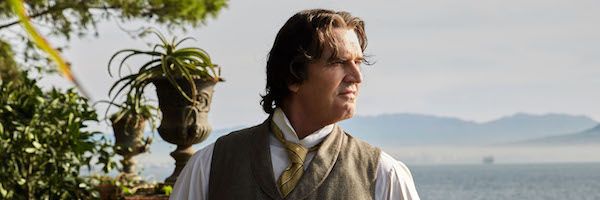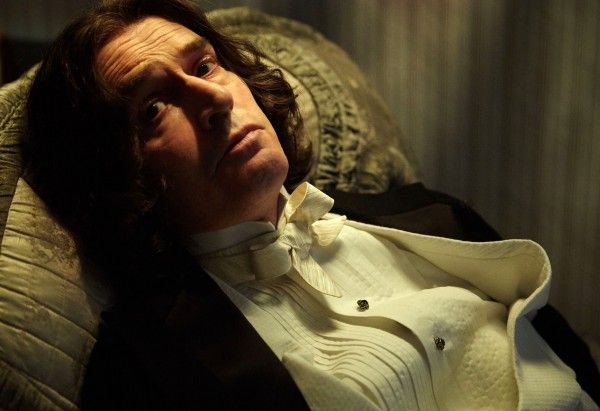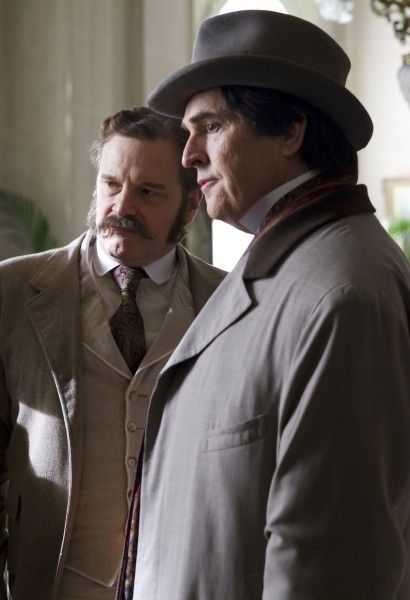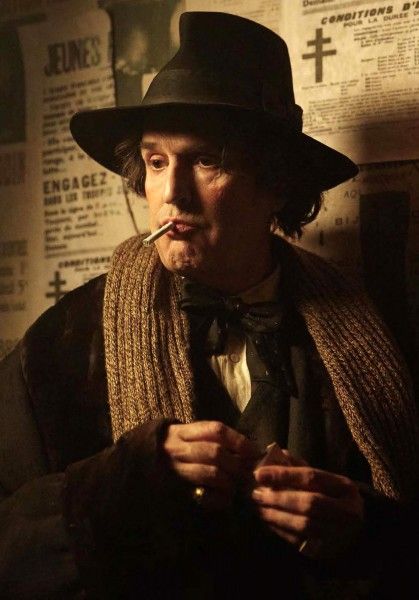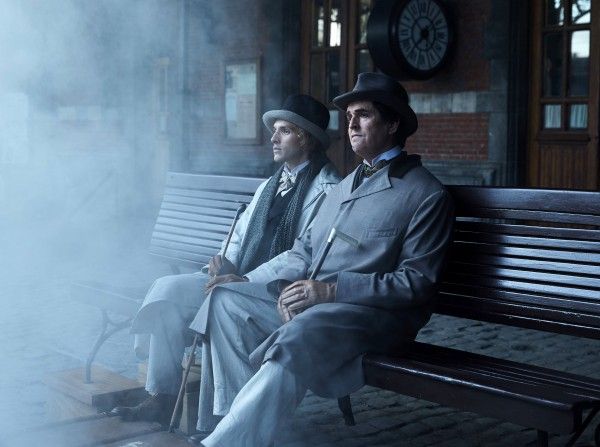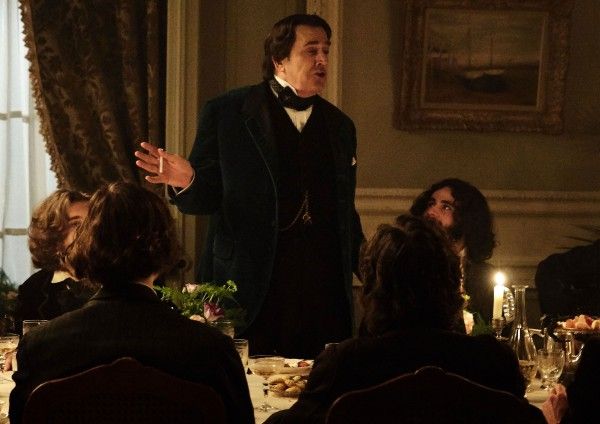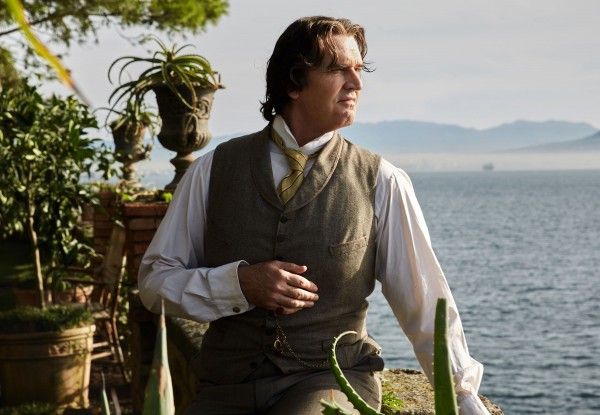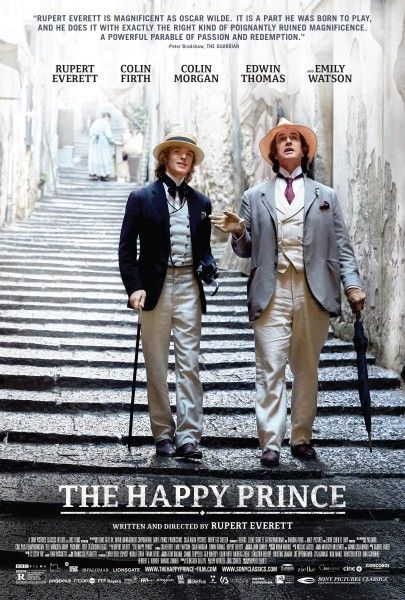Written and directed by Rupert Everett, the biographical drama The Happy Prince finds Oscar Wilde (expertly played by Everett) on his death bed in a cheap Parisian hotel room, as he flashes back to other times and places in his previously very glamorous life. Wilde was a genius with incomparable wit, who kept his long-suffering wife (Emily Watson) at home while living freely among outlaws and urchins, in a society that once worshipped him before turning on him.
At the film’s Los Angeles press day, Collider got the opportunity to sit down and chat 1-on-1 with actor/filmmaker Rupert Everett. During the interview, we talked about the crazy journey he went on to get The Happy Prince made, how proud he is of the final product, the importance of showing a side of Oscar Wilde that we aren’t as familiar with, directing himself vs. the rest of his cast, and what he’d like to do next.
Collider: Truly tremendous work in and on this. It seems like such an insane task to take this on, as the writer, director and lead actor. Did you know how crazy it was all going to be when you got yourself into it?
RUPERT EVERETT: When I decided to direct the film myself, I didn’t really know what was gonna happen. Getting to make the movie was the worst part, really. It was terribly frustrating, taking two steps forward and one step back. And then, I would cancel a piece of work, thinking it was gonna happen, and then it didn’t happen and I’d have no work. That was very depressing. By the time the film actually happened and got to be made, I had to do a tour. I had done this play, The Judas Kiss, by David Hare, which was about Oscar Wilde. I couldn’t get any money from anywhere, so I thought, “If I play the role, maybe I can get some financing,” and it worked. The trouble with that was that I then had to commit doing the play, on tour in England, New York and Canada, which was very long. I was doing the play, right up until pre-production of the film, and going into pre-production, after doing six months in a play, is quite tiring. I didn’t know how I was gonna make it, stamina-wise, but I managed. What I realized, going through the whole thing, is that I had so much more stamina than I had ever imagined. I don’t know if I realized that stamina, earlier on. I wonder what I could have done. I’d probably have just been more of a monster.
How many times, over the years, did you think this was actually going to get made, only to have it fall apart, and how many times did you think it just was never going to happen?
EVERETT: About three times, it was about to be made and then it collapsed because something went wrong. And there were six or seven times that I thought it was never going to happen. Show business is run on optimism and enthusiasm, not reality. One little good thing happens and you’re back in the saddle, off to the next disaster. That’s what got me through, really. It was remarkable for me to have got through it because I’m traditionally a flake and give up very easily. To not have given up on this is very strange for me.
Did you get to the end of it all and go, “I’m really glad that I had that experience”? Once you finally made it through all of that, what were your feelings about it?
EVERETT: Well, there’s no end, really, because the end hasn’t even happened now. There was the end of getting to make the movie, where I thought, “Thank god, I’m finally making the movie.” Then, finishing the movie, I thought, “Thank god, this movie is finished.” Then, finishing the edit, I thought, “Thank god, the edit is finished.” Then, it was the same after the sound edit. Now, the movie is opening and getting out, in all of the different countries. That’s a fairly endless, non-stop job, and that goes on until Australia, and all of those places, next January and February, so it still hasn’t ended. I feel very thrilled to have managed to do it, and it’s gone down pretty well, in general. I feel very proud.
Did you get to a point where you just never wanted to watch the film again, or are you someone that finds something new to appreciate, every time you have to go through it?
EVERETT: I like watching it, actually. I don’t mind watching it, again and again. I’ve watched it a few times. I quite enjoy it. Is that bad?
No, not at all. Some people just seem to hate watching their own work, and this is really your work, all the way around.
EVERETT: I feel fine about it. Everything is a work in progress. Everything could be a thousand times better, if you looked at it, in that way. There are obviously things that I wish I could have done, but the nature of movies is not that. The nature of movies is that, even the most luxurious, expensive movie, in the end, still has a random side to it that you have to embrace because that random side is also part of its good quality, as well. There are bits of it that are probably sketched too roughly and/or too fast, or that are too this or too that, but they also add up, making its general total. If the movie had terrible reviews everywhere, then I would have hated watching it. Since it’s gotten really wonderful reviews, so far, I’ve been very lucky. I’ve rediscovered it, in a way.
This is such an interesting film because Oscar Wilde is somebody that we know of so well, but this is really a side of him that we haven’t seen and it makes him much more human. Was that always important? Was that something that you really wanted to dig into?
EVERETT: Yes. One of the things that’s most important for me was this fact that he’s an ordinary human being. In other words, he has all the bad traits of a human being, which are snobbery, greed, vanity and egomania. All of those things are what bring him down. I think we all have them, but he brought himself down, as a result. No one else did it. Not even society, in a sense because, if he hadn’t taken Lord Queensberry, the father of his lover, to court, then the whole thing wouldn’t have happened. The fact that it happened because of him being so crazy is wonderful because I adore him. He’s an amazing character, and he was in exile because of the punishment he received at the hand of society, basically for being a homosexual. He was also an idiot for getting there, in the first place, but it was because he was a homosexual. That extended beyond prison, and it was another type of prison, really. He was always being forced to move on. He was always being chucked out of restaurants. He was always moving from one hotel to another. He was always being spat on or insulted. He dealt with it in a amazing way. He carved a new constitution for himself, away from the old one, where the stars were rent boys, petty thieves and street urchins. He made a whole new world for himself, where he wasn’t a victim. I find that amazing about him. He retained his sense of humor. He was still curious about people. One of the god-like things about him is his potential for empathy. He was endlessly being cited for extraordinary empathy with people, apart from being an incredible snob, as well. He’s got so many contrasting things to him, which I find very, very attractive.
When you first were introduced and exposed to his work and who he is, did you have any idea that it would live with you for this long?
EVERETT: No. I wa’t that keen on him, at the point when I was introduced to his work, because that was at my drama school. When I was at drama school in the late ‘70s, we wanted to do things where people were blown up, or they killed each other, or they raped each other – the really tough stuff. We felt that Wilde was incredibly old-fashioned and staid, so I hadn’t really thought about it, at all. In retrospect, looking back, he was always there. Even in 1975, when I came to London and it had only been legal to be gay for seven years, we were very much walking in his footsteps. He was someone that every gay person, no matter whether they were educated or uneducated, knew about because of that and because we were still in limbo, despite being recently legalized.
Are you surprised that he’s since been recently pardoned?
EVERETT: More than being surprised, the pardon is so inept because it infers a crime, which we’ve now all agreed that homosexuality isn’t. It’s a typically British and blundering piece of failed diplomacy. They need more than a pardon. They need an apology, really.
You’ve talked about how this was not something you had ever planned on directing. When you realized that you would be the one to have to direct this or it wouldn’t get made, what convinced you to actually step in and do it?
EVERETT: Just the fact that it would die, otherwise. I had written it, and I thought it was quite good. I couldn’t face the idea of it dying.
Is it more challenging to get out of your own head to direct yourself in a scene that you’re acting in, or is it more challenging to try to direct your scene partner while you’re also acting with them?
EVERETT: I found that I have a good visual sense of what’s going on in the room. In terms of directing the actors, the only one who needed any direction was me. None of them needed any. I knew what I wanted to achieve in myself, but I had to work on that a little bit. The other actors were all amazing. They didn’t need any help.
You have such a great cast.
EVERETT: Yeah, they’re fantastic. Even the smaller parts were played by people who are very, very well-known in England. I was very lucky to get all of them and, for that, I am incredibly grateful.
What’s next for you?
EVERETT: I’d like to direct another movie, if I could, and be in it. Otherwise, I’d like to just stay engaged and keep going, as an actor. I love my job. I’ve been involved in it for a long time, and I don’t want to let it die out. I’d just like to keep engaged and do things. Ideally, if you’ve got a magic wand in your bag that you can wave, I’d like to make my next film.
Are you looking to keep directing stuff that you write?
EVERETT: Ideally, I’d like to direct stuff I write.
The Happy Prince opens in select theaters on October 10th.

